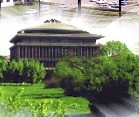Laborator: EG404

Inteligenta
Artificiala
Anul III Sectia Calculatoare
Anul universitar 2004-2005
Titular curs: Profesor
Adina Magda Florea
Email: adina@cs.pub.ro,
Birou: EF201, Corp EF (Catedra de Calculatoare)
Asistenti: Asistent Serban
Radu, Preparator
Monica Babes
![]() Curs: Joi, 11-14, EC004
Curs: Joi, 11-14, EC004
Laborator: EG404
Rezultate Partial - III CA III CB si CC, Altii
|
|
|
|
|
|
|
Obiective
Cursul trateaza aspecte teoretice si practice ale inteligentei artificiale
si are ca scop formarea unei priviri de asamblu asupra disciplinei si a
principalelor domenii ale acesteia.
La sfarsitul cursului, studentii vor intelege principiile de baza ale
inteligentei artificiale si abordarile algoritmice asociate, si vor avea
cunostinte despre aplicatii ale inteligentei artificiale cat si despre
limbajul de programare logica Prolog.
1. Introducere in IAExamen final - 3h
2. Metode de cautare: cautare neinformata, cautare informata
3. Metode de cautare: problema satisfacerii restrictiilor, jocuri
4. Logica simbolica
5. Demostrarea teoremelor. Limbajul Prolog.
6. Sisteme bazate pe reguli.
7. Examen partial - 1 h. Sisteme bazate pe frame-uri.
8. Rationament incert: probabilitati, retele bayesiene.
9. Planificare automata
10. Invatare automata: inductie
11. Invatare automata: metode bazate pe cunostinte
12. Prelucrarea limbajului natural
Laborator
1. Introducere in Prolog
2. Controlul masinii Prolog
3. Tehnici de programare Prolog
4. Predicate predefinite in Prolog
5. Definirea de noi operatori in Prolog
6. Demonstrarea teoremelor
7. Discutii despre articolele citite
8. Mecanisme de cautare in Prolog
9. Cautari informate in Prolog
10. Jocuri in Prolog
11. Sisteme bazate pe reguli
12. Prelucrarea limbajului natural
Obligatorii
Slide-uri curs
Carti
A. Florea, A. Boangiu. Elemente de Inteligenta
Artificiala.
A. Florea. Bazele logice ale Inteligentei
Artificiale. Capitolele 4, 6 si 7.
A. Florea, B. Dorohonceanu, C. Francu. Programare
in Prolog.
Articole on-line
"Computing Machinery and Intelligence", http://www.loebner.net/Prizef/TuringArticle.html,
Turing, A.M. (1950). Mind, 59, 433-460.
"AI's Greatest Trends and Controversies", http://www.computer.org/intelligent/articles/AI_controversies.htm,
IEEE Intelligent Systems January/February 2000.
"A Framework for Representing Knowledge", http://www.ai.mit.edu/people/minsky/papers/Frames/frames.html,
Marvin Minsky, MIT-AI Laboratory Memo 306, June, 1974.
Recomandate
Carti
"Artificial
Intelligence: A Modern Approach", S. Russell & P. Norvig, Prentice
Hall, 1995
"Artificial
Intelligence. Structures and Strategies for Complex Problem Solving",
4th edition, G.L. Luger. Addison-Wsley, 2002
Prolog Programming A First Course, Paul Brna, 1999 (on-line). http://www.cbl.leeds.ac.uk/~paul/prologbook/book.html
Artificial Intelligence through Prolog by Neil
C. Rowe http://www.cs.nps.navy.mil/people/faculty/rowe/book/book.html
Software
Software utilizat la laborator si pentru elaborarea temelor de casa:
SWI-Prolog Free Software Prolog compiler, licensed
under the Lesser GNU Public License.
http://www.swi-prolog.org/
Cerinte
Prezenta la laborator: minimum 6 sedinte de laboratorNotare
Rezolvarea temelor de casa fixate la laborator
Parcurgerea materialelor obligatorii
Examen partial
Examen final
Examen partial: 20%Resurse Web despre IA
Examen final: 50%
Laborator (inclusiv temele de casa): 30%
AI on the Web
http://www.cs.berkeley.edu/~russell/ai.html
Links to 874 pages around the web with information on Artificial Intelligence,
organised by subtopics.
Logic Programming Repository
http://www.afm.sbu.ac.uk/logic-prog/
A Repository on Logic Programming, languages such as Prolog, etc.
The Turing Test Page
http://cogsci.ucsd.edu/~asaygin/tt/ttest.html
Everything you would like to know about the Turing Test, including
a link to the Alan Turing home page.
The CMU Artificial Intelligence Repository was established by Mark Kantrowitz
in 1993 to collect files, programs and publications of interest to Artificial
Intelligence researchers, educators, students, and practitioners.
http://www.cs.cmu.edu/Web/Groups/AI/html/repository.html
The World Wide Web Virtual Library: Artificial Intelligence.
http://archive.comlab.ox.ac.uk/comp/ai.html
Bibliographies on Artificial Intelligence, part of the Collection of
Computer Science Bibliographies.
http://liinwww.ira.uka.de/bibliography/Ai/
http://www.kurzweilai.net/
Everything you may wonder about AI
Reviste on-line
The Journal of Artificial Intelligence Research.
http://www.jair.org
The Journal of Artificial Societies and Social
Simulation. http://jasss.soc.surrey.ac.uk/JASSS.html